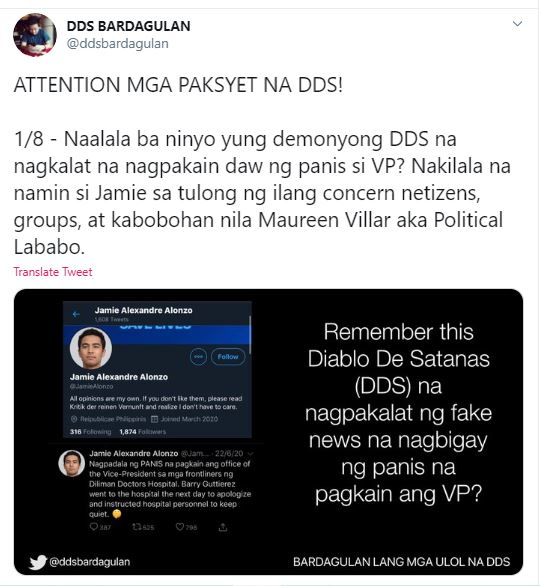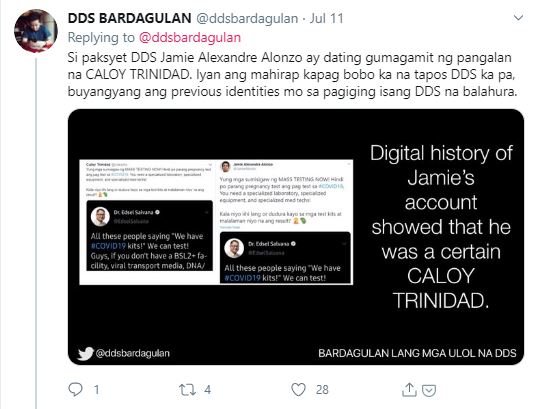
Vice President Leni Robredo warned the public against e-mail spoofing as she denied that her office was sending out e-mails related to the anti-terror law which she sought for stringent safeguards against its abuse.
The second highest-ranking official in a Facebook post disowned a certain e-mail from the address “vp@ovp.gov.ph” which had the subject line of “Anti-Terror Law.”
The e-mail included a message which reads, “Get woke go broke.”
Robredo previously sought stricter safeguards against authority abuse from the highly controversial Anti-Terrorist Act of 2020 which was seen to potentially stifle dissent and curtail constitutionally-protected civil liberties.
She also said that while the law has safeguards, it was “not enough” and added that there should always be a presumption of the tendency for authority abuse.
Six petitions have already been filed at the Supreme Court challenging its constitutionality.
RELATED: A roundup of petitions challenging the Duterte-backed anti-terrorism law
Meanwhile, Robredo’s office said that it has “confirmed” the anti-terror law e-mail was not sent from their e-mail address.
“We are looking into the possibility that this may be another case of spoofing, similar to what we have experienced before,” her office said.
“We thank all those who brought this to our attention,” it continued.
[A] ADVISORY: We have confirmed that this message was not sent from our email address. We are looking into the…
Posted by VP Leni Robredo on Saturday, July 11, 2020
E-mail spoofing is defined as the “creation of emails with a forged e-mail sender address,” according to a cybersecurity company.
“The goal of email spoofing is to get recipients to open, respond and engage with the email message. Email spoofing can greatly increase the effectiveness of phishing and other email-based cyber attacks by tricking the recipient into trusting the email and its sender,” the company said.
It added that spoofing e-mails can also be used by cybercriminals “to gather sensitive information such as credit card numbers and personal information for identity theft.”
Robredo’s office has been the victim of such an incident before. In 2018, the same e-mail address was used to supposedly send a hate message to Rappler CEO Maria Ressa.
Lawyer Barry Gutierrez, Robredo’s spokesperson, denied that the office sent such an e-mail to Ressa and suspected that it was a case of e-mail spoofing.
Victim of fake news peddlers
Robredo earlier sought the public’s help in tracing fake news purveyors who posted and shared social media posts claiming she supposedly handed spoiled food to a hospital in Quezon City.
She urged the public to report their accounts, take screenshots and take note of their profile links for compilation so that they could be reported.
RELATED: Robredo urges public to report ‘fake news purveyors’ who accused her of distributing spoiled food
The official clarified that she never went to the mentioned hospital and added that her team didn’t receive any complaints from such entities.
Meanwhile, Twitter account @ddsbardagulan, an account that exposes social media users spreading fake news and malicious comments or remarks, claimed that the person who initiated the false information was a certain “Caloy Trinidad.”


Robredo has been the top victim of viral fake quotes on social media in 2019, according to fact-checking organization VERA Files.
“Robredo was the most targeted, with six fake statements attributed to her. Half of these went viral after she assumed her appointment as co-chair of the anti-drug inter-agency committee in November, including the one about her ‘wanting’ to prevent police officers from bringing guns and other weapons in drug operations,” the report said.
It added that the official was depicted by fake news purveyors as “someone who speaks nonsensical statements, or someone who protects drug suspects.”
Other victims of malicious disinformation campaigns include notable critics of the Duterte administration and its policies such as Rep. Sarah Elago (Kabataan party-list), Rep. Carlos Zarate (Bayan Muna party-list) and Sen. Risa Hontiveros, as well as human rights lawyer and De La Salle University College of Law Dean Chel Diokno.









